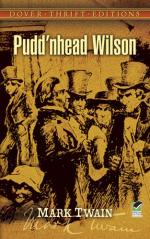To all intents and purposes Roxy was as white as anybody, but the one sixteenth of her which was black outvoted the other fifteen parts and made her a Negro. She was a slave, and salable as such. Her child was thirty-one parts white, and he, too, was a slave, and by a fiction of law and custom a Negro. He had blue eyes and flaxen curls like his white comrade, but even the father of the white child was able to tell the children apart—little as he had commerce with them—by their clothes; for the white babe wore ruffled soft muslin and a coral necklace, while the other wore merely a coarse tow-linen shirt which barely reached to its knees, and no jewelry.
The white child’s name was Thomas a Becket Driscoll, the other’s name was Valet de Chambre: no surname—slaves hadn’t the privilege. Roxana had heard that phrase somewhere, the fine sound of it had pleased her ear, and as she had supposed it was a name, she loaded it on to her darling. It soon got shorted to “Chambers,” of course.
Wilson knew Roxy by sight, and when the duel of wits begun to play out, he stepped outside to gather in a record or two. Jasper went to work energetically, at once, perceiving that his leisure was observed. Wilson inspected the children and asked:
“How old are they, Roxy?”
“Bofe de same age, sir—five months. Bawn de fust o’ Feb’uary.”
“They’re handsome little chaps. One’s just as handsome as the other, too.”
A delighted smile exposed the girl’s white teeth, and she said:
“Bless yo’ soul, Misto Wilson, it’s pow’ful nice o’ you to say dat, ’ca’se one of ’em ain’t on’y a nigger. Mighty prime little nigger, I al’ays says, but dat’s ‘ca’se it’s mine, o’ course.”
“How do you tell them apart, Roxy, when they haven’t any clothes on?”
Roxy laughed a laugh proportioned to her size, and said:
“Oh, I kin tell ’em ’part, Misto Wilson, but I bet Marse Percy couldn’t, not to save his life.”




